Friday, January 18 was the final day of our Seminar 3 and we were very fortunate to be able to spend it on the University of Minnesota St. Paul campus.
Our first speaker of the day was Dr. Brent Hales, Senior Associate Dean and CFO, U of MN Extension. Dr. Hales gave us three important takeaways in his speech of the following; 1. Surround yourself with the best people possible. 2. Give people resources to enable them to be the most successful. 3. Don’t be a jerk – allow others to lead. He also discussed how a previous mentor of his voiced to him that you want people to perceive you as their colleagues, his example spoke specifically to attire.
Climatologist Mark Seeley was our second speaker of the day. Mark is a retired Professor Emeritus of Agriculture and Natural Science at the U of MN, I do think what he is most proud of is his self-proclaimed title of “Weather Geek”. Mark spoke to us about the Drivers of Observed Climate Behavior, which include natural variability, land use and landscape changes and greenhouse gases. He stressed based on the information in the MN Weather Almanac from 2005 to 2015, there have been 17,000 new climate records and 165 daily statewide climate records set or tied after 2005.
Dr. Amy Kircher, Director of the Food Protection and Defense Institute, spoke to us about food fraud, defense and safety. Little did we know that 10% of all food is fraud, classics including olive oil and mozzarella cheese. Nor did we know there are 84 ingredients in a cheese burger sandwich! This huge sum of ingredients makes it hard to track where every ingredient is from and even harder to determine where a source of contamination may have come from. Some of the drivers of food system disruptions are human behavior, weather, changing food regulations, political instability, disasters and population trends. She also discussed that an intelligent adversary observes to find vulnerability, access and evade detection. It is estimated that 15 billion dollars is lost annually to food fraud. Unfortunately, no one is funding food safety, this point was difficult for I think a lot of us to understand why that would be so.
We then took a walk on campus to the Veterinary Diagnostic Lab to meet with Dr. Jerry Torrison, Dr. Jeremy Schefers, Dr. Alex Primus, and Dr. Sunil Mor. Dr. Torrison explained the discussed the types of cases the lab receives to process each year and the roles the lab has in identifying and monitoring emerging diseases. Dr. Schefers spoke in depth about Chronic Wasting Disease (CWD) in white tailed deer and the timelines for the disease in both North America and Minnesota. Dr. Primus talked about fish diagnostics and that there are two types of cases either necropsy or regulatory. Before a live fish can be moved, they must be tested for specific diseases, this is utilized to prevent the movement of infectious diseases with the transport of fish. Dr. Mor discussed turkey arthritis and implications to the industry of the disease on birds and how it can impact the industry. He demonstrated where leg tissue is taken to test for the disease and what the diagnostic lab is doing to help determine a case and potential vaccine.
After the Vet Lab, we gathered together to wrap up our session by each of us giving our “Golden Nuggets”. As we reflected on our four days, a common theme began to surface, relationships. As we look ahead to our next session, which will take place in our Nation’s Capital, Washington D.C., I can say for each of us that we can’t wait for next time!
Submitted by Angelica Hopp, Class X
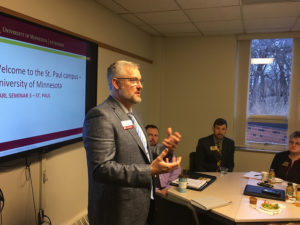
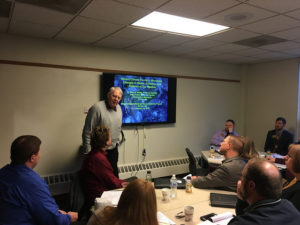
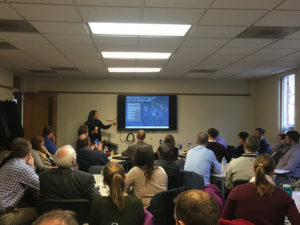
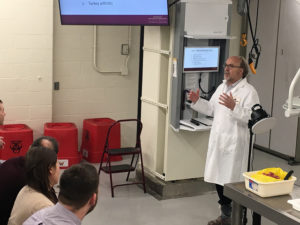
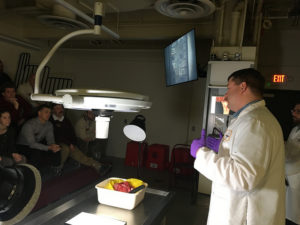
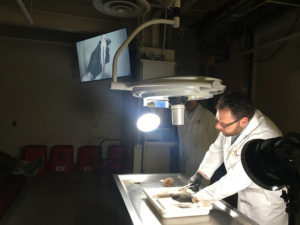
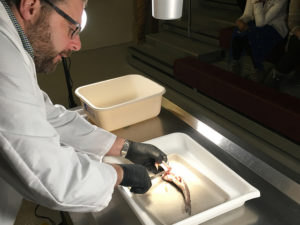
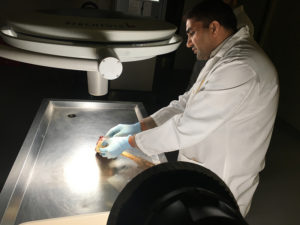
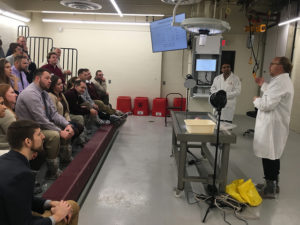
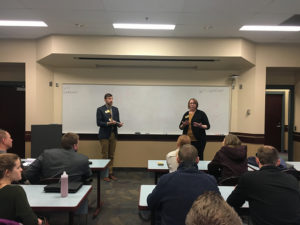
Comments